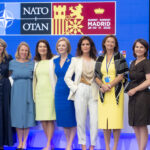
PAKTIKA PROVINCE, Afghanistan -- U.S. Army Soldiers from 1st Platoon, Company A, 1st Battalion, 2nd Infantry Brigade, Task Force Blackhawk, search travellers at a traffic check point outside Combat Outpost Yosef Khel March 9. 1st "Chosen" Platoon was conducting TCP's and clearing missions all day with a platoon from the Afghan National Army. (U.S. Army photo by Sgt. Ken Scar, 7th MPAD)





